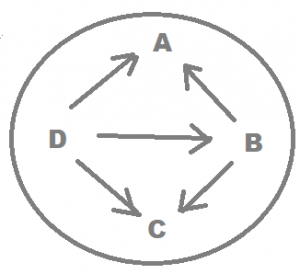BonJour on coherentism
BonJour argues that to have justified belief you need to have good reasons that your belief is true. Otherwise, you are epistemically irresponsible. BonJour rejects basic account of strong foundationalism, which claims that there are self-justified beliefs that do not depend on other beliefs. For instance, I possess the belief that the wall is white. What is the nature of justification I have? By foundationalists, the wall seems to me white and that’s the nature of my subjective experience. BonJour denies the justification of this belief based on some sort of intuition which is non-cognitive and not-linguistic. If my intuition is non-cognitive then I can’t make the basic belief justified. To avoid the regress problem, I would need a second non-cognitive intuition to justify my first one, then a third intuition is needed for a second one etc. So foundationalism fails. The only alternative is the coherentism which relies on some sort of inferential content, a proposition. If beliefs can be justified by appeal to other beliefs in a secular system, we can avoid the regress problem.

The belief that the wall seems to be white is non-inferential in origin, but the justification of this belief is inferential in nature. To justify a particular belief in a holistic way, 4 conditions are required:
- The inferability of that belief from other beliefs and relations among those beliefs.
- it has to be logically consistent,
- systematic connection,
- there may be inferential, evidential, explanatory connection.
2. The coherence of the overall system of beliefs.
If there are observational beliefs, then we could choose a coherent system on the long run. Let’s say, there are S1 and S2 as our systems of beliefs. If S2 beats S1 on the long run in terms of coherence, then we choose S2 as the most coherent system where all the propositions are logically consistent.
3. The justification of the overall system of beliefs.
How do we get from the coherence to the justification? The problem is that we don’t have connections to the real world. We can be in a demon world. The only way to avoid the lift-off, there has to be observational beliefs. If there is empirical knowledge at all there must be an input to the world. There has to be spontaneous systems of beliefs.
4. The justification of the particular belief in question by virtue of its membership in the system.
The only way to establish a connection between justification and truth is to identify truth with the coherent system that was selected after the complete revision.
Critique of Bonjour’s coherence theory
Bonjour’s coherence theory was severely criticized for an obscure connection between coherence and justification. One of the crucial objections relates to the impossibility to choose one system of beliefs among many other, alternative systems. If belief is justified by reference to coherence, then all the equally coherent systems would constitute justified knowledge, thus complicating a choice. Bonjour argues that while picking up a coherent system at the beginning is a challenge, this is the common problem for all theories of knowledge. He sees the solution in filtering less coherent systems by making subsequent observation in the long run.
There is also another concern about the connection of the system of beliefs to reality – “the lift-off problem”. Critiques claim that, according to coherence theory of epistemic knowledge (CTEK), a justification of a particular belief is gained by virtue of its membership in the coherent, self-enclosed system, whereas the connection to the real world is lost. Bonjour uses a similar defensive strategy by making a reference to the observational beliefs, which might help to avoid the lift-off.
A more difficult problem of CTEK is how to establish connection between justification and truth. Bonjour claims that the only way to establish the link is to identify truth with the coherent system that was selected after the complete revision. At the same time he acknowledges the weakness of his argument because of its incompatibility with the traditional correspondence theory: if x is true, iff x corresponds to some fact that exists. Bonjour believes that it is unlikely that a failed system of beliefs, revised by observation, would satisfy the coherence requirement, though he does not fully denies this possibility.
Finally, Bonjour focuses on a deliberate and explicit reasoning, while most of our knowledge is mostly inexplicit. Usually, we are not aware of what confirms our apprehension and how to establish assumptions for our reasoning to make it valid. In this instance, the absolute coherence of our beliefs would not be possible for us, because it is feasible to check thousands of propositions and evaluate them for logical consistency. Suppose the toddler believes that the sun is yellow, even though he has no reason in believing this. According to the CTEK model, the toddler’s belief is not justified and can not be knowledge. Hence, Bonjour’s account is too demanding for a production of justification.
Bibliography:
- BonJour, Laurence, The Structure of Empirical Knowledge, Cambridge, Harvard University Press, 1985